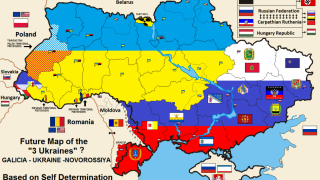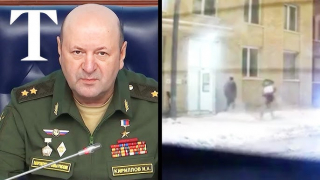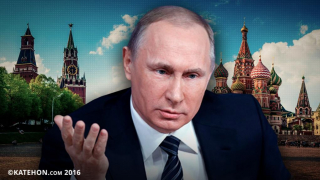Putin's military action is defensive
Argumentative and stable: Jürgen Elsässer in an interview with the Hungarian magazine "Demokrata".
On Moscow's recognition of the Donbass republics and the entry of Russian troops. Statement by the editor-in-chief of COMPACT.
1.) After days of attacks by Ukrainian forces on the Donbass republics, Moscow's move serves to protect the population there. The military aid is comparable to that given to the secessionist republics in Georgia, which the Russian military successfully helped in 2008 against attacks by the government in Tbilisi.
2.) The difference to 2008: The secession republics in Georgia were not recognised by Moscow as independent states, the Donbass republics are now. The Western powers and the majority in the UN Security Council regard this as a breach of international law, which guarantees the territorial integrity of existing states. However, it was NATO that first broke the principle: Through the belligerent secession of Kosovo from Yugoslavia as a result of NATO aggression in 1999.
3.) In international law, two principles stand against each other: the territorial integrity of states and the right of peoples to self-determination. In Yugoslavia, the West enforced the latter militarily - the Kosovo Albanians actually did not want to remain in Yugoslavia in their overwhelming majority. Both in the case of Crimea in 2014 and now in the case of the Donbass republics, Russia is only copying NATO's actions at the time: in both cases, the overwhelming majority of the population did not want or no longer want to be part of the Ukrainian state; most people feel Russian.
4.) Hitler also justified the invasion of Poland in 1939 with the protection of the German ethnic group and with their right to self-determination. However, he used this pretext to occupy and smash the entire Polish state. As long as Putin limits his military action to the Russian Donbass and does not set out to destroy Ukraine as a whole, a parallel is out of the question.
5.) The West will use the current events to quickly prepare the war against Russia. The first steps to be taken are economic preparations for war, above all the burial of Nordstream-2 and the switch to American liquefied gas supplies. It is in Germany's interest to refuse these war preparations and not to allow itself to be deprived of the economic advantages of cooperation with Russia by submitting to sanctions. If Russia fortifies its backyard, this is no cause for concern for Germany.
6.) If there is one lesson from history, it is this: Germans and Russians must never again allow themselves to be set against each other. We are not cannon fodder for Anglo-American oil and gas interests. What is needed now is a new edition of the peace movement that opposed the NATO warmongers back in 2014.
COMPACT provides the argumentative ammunition for this: Order and distribute COMPACT-Edition "Wladimir Putin. Speeches to the Germans" and the sticker "Peace with Russia".
In our TV news programme COMPACT.DerTag we already reported on the escalation last night, tonight we continue. Tune in here at 8 pm (with programme archive).
***
Russia launches attack on Ukraine: Germany must not allow itself to be driven into war! Six theses
By Jürgen Elsässer
Statement by COMPACT editor-in-chief Jürgen Elsässer
1.) The open attack on Ukraine has created the most dangerous situation in Europe since 1945. The risk of a direct confrontation between the superpowers and their allies is higher than in the Yugoslavian war, which was fought only from the air by NATO and accepted by the weakened Yeltsin-Russia.
2.) The aggressor, as observed many times in history, is not the aggressor. The aggression comes from NATO led by the US, which wants to use Ukraine as an offensive platform against Russia and already maintains a permanent military presence in the country. NATO has broken all the promises it made at the time of reunification not to use the end of the bloc confrontation to expand eastwards. The last thing to be shredded was the Minsk Agreement, which provided for pacification of eastern Ukraine with full restoration of Ukraine's sovereignty. Russia wanted that, but the West and the Kiev regime did not.
3.) Putin is not pursuing a neo-Soviet foreign policy, but a neo-Czarist one (see also his speech on Tuesday). The difference is important, because Germany generally got along well with the Tsarist empire, but not with the Soviet Union and its claim to world revolution. Communism today, under the leadership of finance capital, has not been resurrected in Moscow, but in Brussels - in the shape of the EudSSR, its eco-socialist planned economy, its political correctness, its destruction of the traditional values of Christianity and family. Russia, on the other hand, pursues a policy de facto opposed to this neo-communism, although it occasionally pretends to be anti-fascist in order to stimulate the patriotic feelings resulting from the victory over Hitler's Germany.
4.) If Putin's intervention in Ukraine is successful (which, however, see Afghanistan, is by no means certain), a neo-czarist bloc system of Russia, Ukraine and Belarus would emerge, possibly joined by other NATO-threatened states (Armenia, Moldova/Transnistria, Kazakhstan, Syria) and with offshoots into South America (Cuba, Venezuela, Nicaragua). Even the support of Brazil is not excluded - Bolsonaro paid his respects to Putin just a few days ago, to the dismay of the USA.
5.) The renewed division of the world into a US-led and a pro-Russian bloc, albeit under opposite ideological auspices than 1945 to 1989, would be good news. Destructive globalism would come to a halt - and between the blocs there would be room for neutralism and self-reliance. Remember: During the Cold War, countries like Austria, Finland, Sweden, Yugoslavia and India were able to remain neutral and go their own ways, despite Soviet aggression. At that time, the FRG also had more sovereignty than the reunited Germany today, did not have to provide troops for global military adventures of the USA (Vietnam!) and could develop its own Eastern policy.
6.) Germany must not allow itself to be drawn into a war against Russia. If there is one lesson from history, it is this: Russians and Germans must never again allow themselves to be set against each other. Nothing can be expected from our government, loyal to the Anglo-Saxons. A new peace movement must be built against the Scholz-Baerbock regime, demanding strict neutrality in the current conflict, commissioning of Nordstream-2, withdrawal of US occupation troops and withdrawal from NATO.
https://www.compact-online.de/putins-militaeraktion-ist-defensiv/












